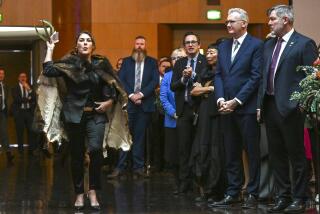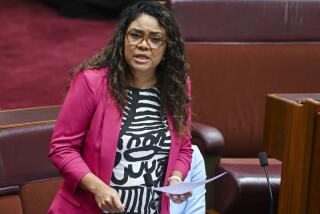Australia Leaves Asians Aghast
- Share via
All countries have their bigots, of course, and do they ever come out of the woodwork, or in Australia’s case out of the back woods, when times are rough. Recall that as recently as the 1991-’94 U.S. recession, Latin American immigrants became prime targets of people’s frustration here. Now it’s Australia, sadly--suffering from recession, high unemployment and inept government--that’s revealing to the world the predictable face of racism. The head of its new One Nation Party--first-term member of parliament Pauline Hanson, a former rural fish-and-chips shop proprietor--unapologetically scapegoats Asians and urges them to go back wherefrom they came: “We are in danger of being swamped by Asians,” she declaimed last year in her now-notorious maiden speech in Parliament. “They have their own culture and religion, form ghettos and do not assimilate. Do we need or want any of these people here?”
Hanson has proved a one-woman wrecking machine for the image of Australia, a key U.S. ally in the Asian region, and a complete bafflement to Prime Minister John Howard, who seems not to know what to do about her. On top of this, last week, government officials were unceremoniously scurrying around the South Pacific apologizing to neighbors for insulting them at a recent conference. There, confidential and stickily sensitive Australian government briefing papers, with negative personal assessments of leading regional political leaders, were, in an act of amazing incompetence, left out in the open. And what riveting regional newspaper reading they became. Neighboring ministers were described as corrupt, Malaysia as the amoral underminer of small South Pacific governments, and a New Zealand official as, among other things, a hard-drinking, late-hours nightclubber. The effect of the blunder, in combination with Hansonism, was to reinforce long- held suspicions of a patronizing--and sometimes racist--Australia.
Australia requires economic integration with Asia if it is to grow, but, already, Hanson, 43, is more famous internationally than anyone who clustered around 1994’s anti-immigrant movement here. In much of Asia, she is now more recognizable than Alexander Downer, Australia’s peripatetic foreign minister. That fact greatly agitates thoughtful Australians everywhere, including Robert O’Donovan, Australia’s counsul general in Los Angeles. He worries how “Hanson has cleverly pitched her story to the Australians left behind by progress.Lots of people over there are frightened by what is happening with the economy and with all this immigration.Not since the Vietnam War have we had such a fault line to divide us.”
In fact, Hanson joins the infamous if small club that includes France’s Jean-Marie Le Pen, Russia’s Vladimir Zhirinovsky and even America’s Pat Buchanan--deceitful masters at concocting convenient scapecoat explanations for complex problems. But they do fill a vacuum. As Harvard’s Dani Rodrik urges in the current Foreign Policy quarterly, governments everywhere must face up to the power of globalism to scare domestic constituencies to death. Only at their peril can they deny its distributional implications, especially at the wage scale’s low end, where ever-lower-cost labor seems always available somewhere else. Of course the policy answer is not exclusionism, but that and a dollop of protectionism will do for many people, at least until something better comes along.
In 1994, Gov. Pete Wilson, desperate for reelection, rode the back of the Proposition 187 tiger and garnered a second term--a victory ungloried by the tawdry methods by which it was won. Politicians, alas, cannot always be counted on for moral leadership: Australia’s prime minister, who heads the ruling Liberal-National coalition, for too long held his breath, hoping that the One Nation phenomenon would somehow go away. It didn’t. Now, Howard finds himself in the hot seat because of his failure to go after Hanson from the start. Not nearly as reticent or slow-moving were leaders in Asia, who denounced Hansonism early and often. In Japan, anti-Australian feeling at one point reached such a fever pitch that Prime Minister Ryutaro Hashimoto himself had to intervene to calm everyone down and deny that Japan would now try to isolate Australia diplomatically.
Australia, which fought with America in every war this century and is just a few stepping stones away from Japan, China, India and Indonesia, is vital to the West, which cannot afford poisons like Hansonism in its ally’s veins. “The world needs Australia,” said President Clinton there last year, “the world needs the United States. It needs us together as partners and friends and allies.” If so, then it also needs stronger voices than Howard’s. Until just recently, Australia sported spunky prime ministers like Paul Keating and Bob Hawke. They were widely respected in Asia as modern leaders who helped steer their nation toward a kind of cosmopolitan kangaroo globalism that warmly invited Asian immigration and entrepreneurship while not denying Australia’s inimitable down-home Aussieness.
Australia should eventually recover, but for now it is an ethically hobbled U.S. ally whose long campaign to make friends and influence people in Asia has hit a wall--leaving it in danger of winding up as nothing more than the dead-ended capital of the South Pacific. While Hansonism as well as the sour aftertaste of the conference-papers flap may well fade when the economy recovers, Australia’s problem may not altogether disappear: America’s memory span may be short; Asia’s is not.
More to Read
Get the L.A. Times Politics newsletter
Deeply reported insights into legislation, politics and policy from Sacramento, Washington and beyond. In your inbox twice per week.
You may occasionally receive promotional content from the Los Angeles Times.










